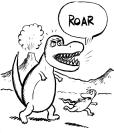
However there is no reasons why we have no conclusive answer to the mystery
of the K-T event. Several complications that make work hard for the scientist/detectives
trying to crack this case:
The Fossil Record:
Most data on the K-T event comes from North America, which one of the
few areas is known that has a somewhat continuous fossil record (remember,
fossils are only formed under certain rare conditions, and are only found
in sedimentary rocks). The infamous Hell Creek locality in Montana is
one such continuous site enclosing the K-T boundary. The secret to the
K-T event may lie within our collections; who knows! Anyway, we don't
know much about what was occurring in the rest of the world at the time
of the K-T event. The marine fossil record gives us great hints about
what was occurring within the sea, but how applicable is that to what
went on in the terrestrial realm?
Extinction is not a simple event; it is not simply the death of all representatives of a group. It is the cessation of the origination of new species that renders a group extinct; if species are constantly dying off and no new ones originate through the process of evolution, then that group will go extinct over time no matter what happens. New dinosaur species ceased to originate around the K-T boundary; the question is, were they killed off (implying causation, especially a catastrophe), or were they not evolving and simply fading away (perhaps implying gradual environmental change)?
Determining the age of rocks or fossils that are millions of years old is not easy; carbon dating only has a reasonable resolution when used with organic material that is less than about 50,000 years old, so it is useless with the 65 million year old K-T material. Other methods of age determination are often less accurate or less useful in certain situations. So we don't know exactly when the dinosaurs went extinct, and matching events precisely to give a picture of what was happening at a specific moment in the Mesozoic is not easy. Thus, the ultimate question of a gradual decline of dinosaurs vs.